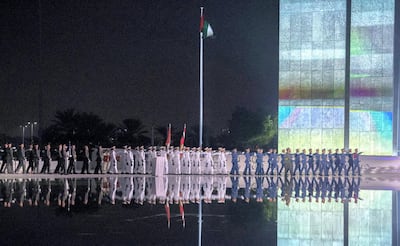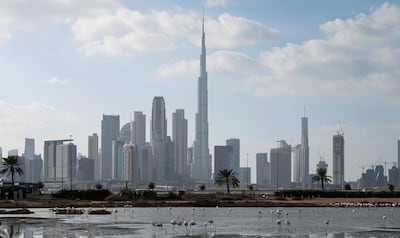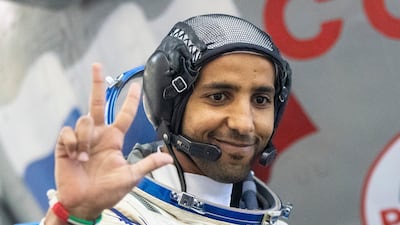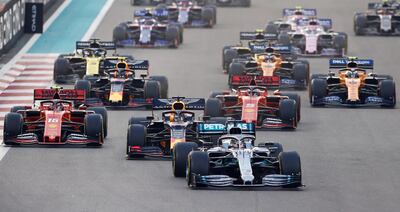What is the most important structure to be built in the UAE during the past decade?
Is it the Burj Khalifa in Dubai, inaugurated in 2010 and, at nearly 830 metres, the world’s tallest building?
Or maybe the shining dome of Jean Nouvel’s Louvre Abu Dhabi, opened two years ago to worldwide acclaim and the jewel in the crown of the Saadiyat Cultural District?
Arguably it is neither of these, but a collection of stark, leaning pillars of stone that face Sheikh Zayed Grand Mosque in the country’s capital.
The Wahat Al Karama memorial was opened on November 30, 2016. It honours and records the names of those who died serving their country, beginning with Salem Suhail Al Dahmani, the policeman who died defending Ras Al Khaimah’s Greater Tunb against Iranian invasion on the eve of the UAE’s birth.
The great majority of the names on Wahat Al Karama’s roll of honour are fresher in the memory. They include the more than 50 soldiers killed on a single day in September 15, 2015, when a Houthi missile landed on their camp in Yemen.

Wahat Al Karama is reminder of the price of peace and stability. It is a marker of a country that has accepted and embraced its role on the world stage, that is not afraid to step forward even when there is a price to be paid.
Ten years ago, that role was perhaps not quite so visible – at least to the rest of the world.
The UAE, and especially Dubai, was known as a place to escape to, especially for Europeans fleeing the rain and snow for some winter sunshine.
Its reputation rested on five-star hotels, beaches and buffets, desert safaris and an abundance of shopping.
The airlines that carried you there, Emirates and Etihad, had already acquired a world-class reputation for service and quality.
These days, the image of the UAE cannot be distilled to a mini-break in January any more than it can for the USA or China. In world affairs, the country has something to say, and increasingly it is heard and listened to.
The process has taken place at many levels. The UAE’s infrastructure has developed to a point it can welcome events of any size and complexity.
Most recently, it hosted the Special Olympics World Games in Abu Dhabi, with 7,000 athletes from 200 nations. Coming in the New Year is Expo 2020 Dubai, with the expectation of millions of visitors from all over the world.
Beyond that, there have been dozens of other occasions to put the UAE on the world stage including the Fifa Club World Cup four times, most recently last year.
There was the 2017 international vocations skills competition, WorldSkills Abu Dhabi, and the World Professional Jiu-Jitsu Championships this year.
And, of course, the Abu Dhabi Grand Prix, first staged on the eve of the new decade in November 2009, and now firmly established in the F1 calendar.
Immaculately organised, and with any drama restricted to the arena or track, these great occasions have shown that Abu Dhabi and Dubai are the equal of Paris, Moscow, Beijing and New York when it comes to staging the world’s great occasions.
The bigger picture shows that the UAE is as much a willing participant as it is a generous and welcoming host. It is a policy with internal and external benefits. Ten years ago, Abu Dhabi became the headquarters of the United Nations body devoted to renewable energy – Irena is located in Masdar City, a community that shares these objectives.
Its presence, and the often-ground breaking research and training carried out at the Masdar Institute of Science and Technology, demonstrate the government’s understanding that the country’s economy must change from a dependency on oil and gas to a much broader model.
The construction of the Barakah nuclear power plant, which began in 2011, means that around a quarter of the UAE’s electricity will be supplied by clean energy when it becomes operational in the near future.
Barakah is overseen by the Federal Authority for Nuclear Regulation, its independence and transparency recognised internationally as following the highest standards for safety and non-proliferation.
When it comes to nuclear power, the world sees the UAE as a safe pair of hands.
It also brings new skills to the workforce, with about 70 per cent of the current workforce consisting of UAE nationals, highly trained and holding the most senior positions.
In Al Ain, Strata Manufacturing has become the Arabian Gulf’s only producer of aircraft parts, working for Airbus since 2010, and for Boeing a year later.
Next year, Strata will begin exporting vertical fin ribs for the tail section of the Boeing 787 Dreamliner.
This emphasis on self-sufficiency, on developing skills that were once outsourced to other countries, is particularly evident in the growth of the UAE’s space industry.
It is not merely about the national pride felt when Hazza Al Mansouri became the first Emirati in space in September.
At YahSat in Abu Dhabi, Emirati engineers are building commercial satellites, while the Mohammed bin Rashid Space Centre in Dubai developed and launched the Earth observation satellite KhalifaSat last year as preparation for sending the Hope exploration probe to Mars in 2020.

Shifting from dependence on fossil fuel revenue will mean profound changes to a society where well-paid government jobs bolstered by state benefits have long been the norm.
It is a task that has progressed steadily over the past decade and will continue at least through the next.
Providing opportunities for Emiratis to adapt to and thrive in this new world is part of this.
From a handful of buildings in central Abu Dhabi in 2010, New York University Abu Dhabi has expanded to a state-of-the-art campus on Saadiyat Island, becoming one of the world’s leading centres of research and learning.
The past two years have seen Emirati graduates win three prestigious Rhodes Scholarships at the University of Oxford in the UK.
Their achievements are part of a shifting perception of the UAE and its people.
The country has long been generous in its international aid, but now we see Emirati doctors and nurses working in Jordanian camps for Syrian refugees and Emirati health workers raising awareness on the ground of the importance of vaccinating children in Afghanistan and Pakistan against the scourge of polio.
In 2014, the world was transfixed by footage of Maj Mariam Al Mansouri, the country’s first female fighter pilot, leading air strikes against ISIS extremists in her F-16.
It was a moment that confronted and confounded outdated stereotypes of the role of women in the Arab Muslim world.
Ten years ago, Sheikha Lubna Al Qasimi was the sole female minister in the UAE. As we enter the next decade, there are nine, including Minister of Youth Shamma Al Mazrui who, at 22, was the youngest in the world when appointed.
It is a reminder that in the story of the UAE over the last 10 years, looking back reveals a great deal about what to expect from the country’s future.



